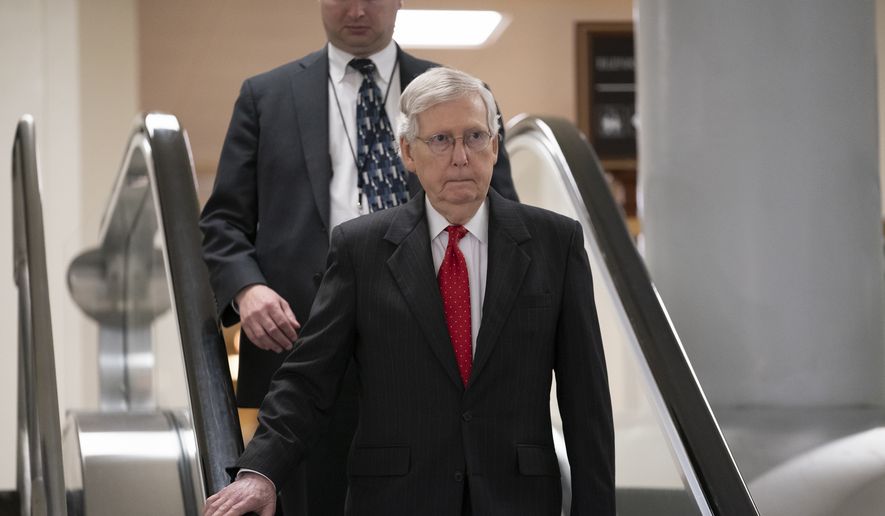The odds of President Trump being convicted in the Republican-held Senate or even impeached by the Democratic-run House is a long shot, despite Washington being consumed by impeachment mania.
Senate Majority Leader Mitch McConnell on Monday brushed aside any chance that Republican senators would stonewall an impeachment trial if the House charges Mr. Trump at the conclusion of its investigation.
“Under the Senate rules, we’re required to take it up if the House does go down that path,” he said during an interview on CNBC. “I would have no choice but to take it up.
“How long you are on it is a different matter,” he added.
The House is conducting an impeachment investigation, with the backing of House Speaker Nancy Pelosi and with six committee chairmen taking an “umbrella approach” to investigating the president.
The main priority for Democrats is Mr. Trump’s conversation with Ukrainian President Volodymyr Zelensky on July 25.
The explosive allegations that Mr. Trump pressured the Ukrainian president into investigating former Vice President Joseph R. Biden, a 2020 Democratic presidential front-runner, and his son Hunter, and attempted to hide it from Congress sparked a surge for impeachment.
Dozens of lawmakers came forward last week to announce their support for an inquiry or moving straight to impeachment.
However, it’s highly unlikely that the Republican-held Senate would convict Mr. Trump.
Only three presidents have faced the threat of impeachment, but none has been removed from office. Andrew Jackson and Bill Clinton were impeached by the House but acquitted by the Senate, and Richard Nixon resigned before he could be charged.
While the most recent counts show more than 200 House Democrats favoring at least starting the inquiry, they would need at least 218 to impeach the president.
If it were to turn to the Senate, U.S. Chief Justice John G. Roberts Jr. would preside over the trial and it would require a two-thirds supermajority vote to convict the president.
How long that trial could last is another question.
A case in point: Mr. Clinton’s impeachment trial in 1998.
The trial lasted five weeks, but Sen. Robert Byrd attempted to dismiss the charges, forcing a full Senate vote that sustained the case on a party-line vote.
While a handful of Republican senators are hesitating to rush to the president’s defense and calling for more investigations into the matter, several Republican senators say Democrats have a dud on their hands and argue that the Bidens’ and 2016 Democratic presidential candidate Hillary Clinton’s connections to Ukraine should be investigated.
The latest polling shows the first signs of significantly growing support for impeachment among the public.
Though still lacking a majority, public support for impeachment had been virtually stagnant during the summer. Now, according to data from Quinnipiac, voters are now virtually split on impeaching Mr. Trump — 47% in favor and 47% against.
According to Quinnipiac’s data, 50% of voters believe Mr. Trump was in the wrong during his conversation with Mr. Zelensky, with 87% of that group believing it was seriously wrong. Generally, 52% of voters said asking a foreign leader for help in an election merits impeachment.
“Following a week when House Democrats announced a formal impeachment inquiry into President Trump and more information emerged about the president’s actions regarding Ukraine, public opinion about impeachment is showing a shift,” Quinnipiac University Polling Analyst Mary Snow said in its news release.
Last week, Quinnipiac’s numbers showed a large gap, with 37% in favor and 57% against impeachment.
Opinion among Republicans hardly shifted, though Democrats are now virtually united in support and more independents are shifting toward backing impeachment.
• Gabriella Muñoz can be reached at gmunoz@washingtontimes.com.




Please read our comment policy before commenting.